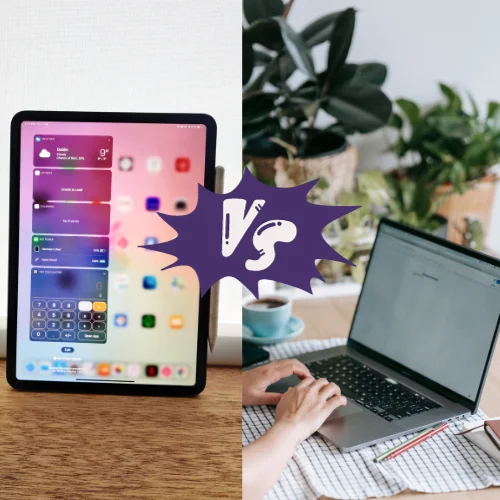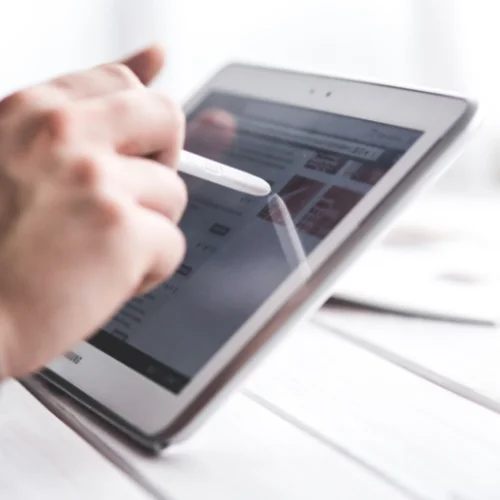iPad vs. Laptop for Seniors: Choosing the Right Tech Companion
When it comes to embracing technology, seniors often find themselves at a crossroads. The choice between an iPad and a laptop is a common dilemma, each device offering unique features and benefits. In this comprehensive guide, I will talk about the merits of both iPad vs. Laptop to help seniors make an informed decision tailored to their needs.

User-Friendly Interface
First and foremost, let’s delve into the user interface of both devices. iPads, with their touch-screen capabilities, provide an intuitive and tactile experience. Seniors who may struggle with traditional mouse and keyboard setups find the iPad’s touch gestures more accessible. For instance, swiping, tapping, and pinching to zoom are natural movements that mimic real-world actions.
On the other hand, laptops offer a more familiar interface for those already accustomed to desktop computing. The keyboard and mouse setup might be advantageous for seniors who find touch screens less precise or challenging due to arthritis or other physical limitations.
Portability and Convenience

One of the standout features of an iPad is its portability. Weighing significantly less than most laptops, iPads are easy to carry and handle, making them an excellent choice for seniors on the go. Whether it’s for reading e-books, checking emails, or video calling the grandkids, the iPad provides a seamless and lightweight solution.
Laptops, while still portable, tend to be bulkier and heavier. However, they come with the advantage of a built-in keyboard, eliminating the need for additional accessories. The decision between an iPad and a laptop may hinge on the senior’s lifestyle – frequent travelers may lean toward the iPad, while those primarily using the device at home might find a laptop more suitable.
Applications and Software Compatibility
An important consideration for seniors is the availability of applications and software on each platform. iPads, with their extensive App Store, boast a plethora of applications catering to various interests and needs. From health and wellness apps to games designed for cognitive stimulation, the iPad ecosystem is rich and diverse.
Laptops, being more traditional computing devices, offer compatibility with a broader range of software applications. This can be crucial for seniors who rely on specific programs for work, hobbies, or staying connected with their community. It’s worth noting that iPads are continually expanding their software compatibility, but laptops still hold an edge in this regard.
Learning Curve and Tech Literacy

For seniors new to technology, the learning curve is a significant factor in choosing between an iPad and a laptop. iPads are often praised for their user-friendly design, making them accessible even for those with limited tech literacy. The touch-based interface simplifies many tasks, and the App Store’s curated environment ensures a safe and straightforward experience.
Laptops, while offering a more traditional computing environment, may have a steeper learning curve. Seniors who are already comfortable with desktop interfaces may find this transition smooth, but for those new to technology, understanding concepts like file management and system settings could be challenging initially.
Connectivity and Communication

Staying connected with friends and family is a top priority for many seniors. Both iPads and laptops excel in this regard, but their approaches differ. iPads shine in video communication with user-friendly apps like FaceTime. The simplicity of tapping a contact and seeing them on the screen appeals to many seniors who value easy and direct communication.
Laptops, on the other hand, offer a wide range of communication options, including video calls, emails, and instant messaging. The advantage here lies in the versatility of platforms like Zoom and Skype, which are not only accessible on laptops but also widely used in various professional and personal settings.
Entertainment and Hobbies
When it comes to entertainment, both iPads and laptops offer a myriad of options. iPads, with their vibrant displays and interactive touch capabilities, are ideal for streaming videos, playing games, or reading e-books. The App Store’s extensive collection caters to a diverse range of hobbies, from art and music to puzzles and photography.
Laptops, with their larger screens and robust computing power, provide an immersive entertainment experience. Whether it’s watching movies, listening to music, or indulging in graphic-intensive games, laptops have the edge in terms of sheer performance. Seniors with specific entertainment preferences may want to consider which device aligns better with their hobbies.
Cost Considerations
Finally, let’s talk about the elephant in the room – cost. Budget constraints often play a crucial role in deciding between an iPad and a laptop. iPads, while offering a sleek and portable solution, can be relatively expensive, especially when considering higher storage capacities and cellular connectivity options.
Laptops, with their diverse range of models and price points, provide more flexibility in terms of budget. Seniors on a tight budget may find that a basic laptop fulfills their needs without breaking the bank. It’s essential to weigh the features against the budget constraints to strike a balance between functionality and affordability.
Comparative Analysis
| Feature | iPad | Laptop |
|---|---|---|
| Interface | Touchscreen, intuitive with taps and swipes | Keyboard and mouse, familiar for long-time users |
| Portability | Lightweight, compact size, ideal for on-the-go | Generally bulkier, might be heavier |
| Multitasking | Limited multitasking capabilities, better for single-app focus | Excellent multitasking with multiple windows |
| App Ecosystem | Vast app selection, touchscreen-optimized apps | Diverse range of software, professional applications |
| Expandability | Limited peripheral support, less expandability | Extensive peripheral support, more options |
| Accessibility Features | Highly customizable, VoiceOver, touch gestures | Accessibility features, but less customization |
| Operating System | iOS, streamlined and consistent | Windows, familiar interface for long-time users |
| Communication | FaceTime for video calls, seamless integration | Skype and other options available |
| Social Media | User-friendly apps, easy sharing | Requires familiarity with browser interfaces |
| Learning Curve | Shorter learning curve, user-friendly | Steeper learning curve, especially for novices |
| Battery Life | Generally longer battery life | Varies, some laptops offer competitive battery life |
Pros and Cons of iPad for Seniors
| Pros of iPad for Seniors | Cons of iPad for Seniors |
|---|---|
| 1. Intuitive Touchscreen Interface: | 1. Learning Curve: |
| – Easy navigation with taps and swipes | – Seniors accustomed to traditional |
| – Ideal for those unfamiliar with | keyboards and mice may find a |
| traditional computers | touchscreen challenging initially |
| 2. Portability: | 2. Limited Multitasking: |
| – Lightweight and compact design | – Compared to laptops, iPad’s ability |
| – Ideal for on-the-go usage | to multitask with multiple apps is |
| somewhat limited | |
| 3. Vast App Ecosystem: | 3. Limited Peripheral Connectivity: |
| – Diverse apps catering to various | – Connecting external devices, such as |
| interests and needs | printers or external drives, may |
| – Simplified app store experience | be less straightforward |
| 4. Accessibility Options: | 4. Operating System Transition: |
| – Highly customizable for seniors | – Seniors familiar with Windows may |
| with specific needs | find iOS a departure from what |
| – VoiceOver, text enlargement, and | they’re used to |
| touch gestures enhance accessibility | |
| 5. Seamless Communication: | 5. Limited File Management: |
| – FaceTime for easy and intuitive | – Managing files on the iPad is |
| video calling | somewhat simplified, which may be |
| – User-friendly social media apps | limiting for those accustomed to |
| enhance connectivity | traditional file structures |
Pros and Cons of Using a Laptop for Seniors
| Aspect | Pros | Cons |
|---|---|---|
| Usability | – Familiar keyboard and mouse interface. | – Learning curve for those unfamiliar with traditional PCs. |
| Multitasking | – Ability to run multiple applications simultaneously. | – Smaller screens may limit multitasking efficiency. |
| Software Compatibility | – Wide range of software and applications available. | – Some software may be complex for seniors to navigate. |
| File Management | – Traditional file organization system. | – May require more manual file management for some seniors. |
| Expandability | – Connectivity for external devices (printers, etc.). | – Laptops can be bulkier and less portable. |
| Customization | – Extensive accessibility features and settings. | – Configuration may be overwhelming for some seniors. |
| Operating System | – Familiarity for users accustomed to Windows. | – Windows updates and maintenance can be intrusive. |
| Communication | – Video calling options with platforms like Skype. | – FaceTime not native to Windows laptops. |
| Social Media Integration | – Seamless sharing on social media platforms. | – Smaller and less intuitive touchpad compared to tablets. |
| Portability | – Portable but less so than tablets like the iPad. | – Battery life may be shorter than dedicated tablets. |
iPad vs. Laptop for Seniors – Which One to Choose?
In the ever-evolving landscape of technology, the choice between an iPad and a laptop for seniors boils down to personal preferences, lifestyle, and individual needs. The user-friendly interface of the iPad, coupled with its portability and rich app ecosystem, appeals to those seeking simplicity and convenience.
On the other hand, laptops offer a more traditional computing experience with broader software compatibility, making them suitable for seniors with specific requirements.
So, iPad or laptop – which one suits your needs better? Consider your priorities, test out both options if possible, and decide based on what aligns with your lifestyle. Whichever path you choose, the key is to embrace technology at your own pace and enjoy the many benefits it brings.
What factors influenced your choice between an iPad and a laptop, or are you still deciding? Share your experiences and thoughts in the comments below.

